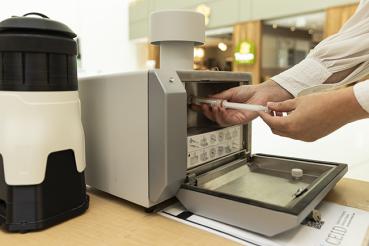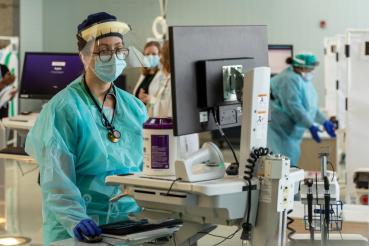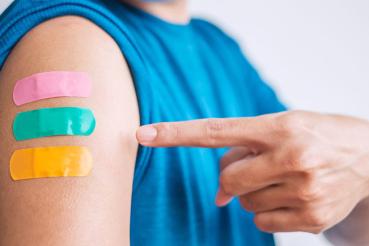Volunteerism is a central part of Rush University Medical Center’s culture, and volunteers are crucial to the Medical Center achieving Rush’s mission to improve health. While the COVID-19 pandemic disrupted regular volunteer programs, Medical Center Rush volunteers have provided help wherever and however they could, from helping administer tests and vaccines for COVID-19 to bringing food to community members in need. April 18 through 24 is National Volunteer Week, an annual recognition of the important role volunteers play in organizations and their communities, and an occasion for a look at some of the many ways volunteers contribute at Rush.
Prior to the COVID-19 pandemic, between 750 and 1,000 people ranging from high school students to retirees volunteered each month through the Medical Center’s Office of Volunteer Services. In April 2020, the Medical Center paused these volunteer activities due to the pandemic, but in July they slowly resumed, allowing volunteers to return with restrictions related to age, health or the areas they served.
In addition to resuming their normal activities as much as possible, the volunteers also were able to assist the Medical Center’s employee flu vaccination program, which was a massive undertaking due to the social distancing protocols in place.
“Volunteer Services was an integral part of our flu vaccination process. Because of COVID-19, flu vaccines this year were especially important to keep everyone at Rush safe," says Lisa Weichman Harries, MSc, MA, director of operations, Employee and Corporate Health Services. “Rush volunteers stepped up to help with running the flow of the socially distant flu vaccination site and record management in Employee Health, and they were on deck to lend a hand when other needs arose. We could not have done it without them."
Standing alongside health care heroes
Starting with the fall COVID-19 surge, volunteers also have served as essential workers, stepping up to support hourly specimen transport for the Medical Center’s asymptomatic testing area and COVID-19 drive-through testing, and they continue to provide this support now.
Despite the pandemic’s disruptions, these volunteers still provided more than 325,000 hours of service in 2020. The approximate value of a volunteer’s time in 2020 reached $27.20 per hour, according to Independent Sector, an organization of charities, foundations and corporations, meaning that the volunteers contributed nearly $9 million in donated time.
“Volunteers remain a strength at Rush, as we rebuild the program and support almost every area of the Medical Center in some fashion,” says Terence Maynard, director of Hospital Guest Relations at the Medical Center, which include Volunteer Services. “Volunteers have stood by the sides of our health care heroes during the pandemic and deserve our appreciation.”
Individuals and departments at the Medical Center can show their appreciation in many ways, sending Volunteer Services a special treat (cakes, cookies, etc.), donating to the annual volunteer scholarship program or simply letting a volunteer know how appreciated they are.
A major role in a massive vaccination effort
Volunteers also have been essential to the success of the Medical Center’s work providing vaccinations against COVID-19. To date, the Medical Center has administered more than 105,000 vaccines at its main clinic in the Edward A. Brennan Entry Pavilion and a clinic in the Austin neighborhood on Chicago’s West Side.
The Brennan clinic is staffed by 96 people a day, 4 days a week, and approximately 70% of them are volunteering their time. These volunteers include retired former Rush nurses, clinical and non-clinical employees helping before or after work and on weekends, Rush University students, and the helpers from the Volunteer Services office. Volunteers entirely staffed the Austin clinic during the 10 days in March and April that it was opened (mainly on weekends), with 72 volunteers from Rush each day helping provide more than 7,500 vaccines to residents of Austin, one of the neighborhoods hit worst by the pandemic.
“I can’t say enough about the impact our volunteer workforce has made on the delivery of COVID-19 vaccine to our employees and the community,” says Patty Nedved, RN, MSN, CENP, FABC, associate vice president and chief transformation officer, who is managing the Medical Center’s vaccination program. “Their enthusiasm, clinical expertise and welcoming attitude have made a tremendous difference in our vaccine clinic and have led to countless accolades and compliments from our patients. Thank you, and we celebrate you this week and always!”
“I am humbled every day to work alongside our volunteer team. The impact they’ve made and their dedication to our communities are unmeasurable,” adds Erin Provagna, MHSA, administrative fellow, who is responsible for the daily operations of the Brennan vaccine clinic. “The vaccine clinic would simply not run without our volunteers, and I hope they know how grateful we are!”
Helping feed a community in need
Employees and students also volunteer extensively in the communities Rush serves. In 2018, some of that work was formalized with the launch of the Rush Employee Volunteer Program (EVP), along with a policy that provides paid hours off for employees to volunteer.
Volunteering not only provides needed services in Rush’s neighboring communities, says Julia Bassett, manager of health and community benefit; it also helps employees who don’t live nearby become more familiar with those communities and their residents, strengthens Rush’s culture of giving back and establishes connections among employees who volunteer together.
When the COVID-19 pandemic hit, it quickly became clear to Rush providers and the Office of Community Health Equity and Engagement (CHEE) team that food insecurity in neighboring communities was increasing, “and we needed to act fast,” Bassett said.
In less than a week, CHEE recruited and deployed Rush volunteers to call patients who were identified as potentially having food insecurity. They connected those who needed assistance with food pantries and help applying for programs like the Supplemental Nutrition Assistance Program or Meals on Wheels, and additional Rush volunteers delivered free boxes of nutritious food to their homes.
Since late March 2020, Rush volunteers have delivered more than 4,800 meal boxes that have fed more than 19,000 people who are in need of healthy food. Rush’s “Feeding the Community” video gives a glimpse of the need and how Rush volunteers have stepped up to help meet it.
Every community is home to many organizations that could use volunteer help, Bassett says. “If you have time to dedicate, find a way to do that — either with us, or with a community-based organization in your area. Find a way to get engaged, and you’ll see the rewards.”




